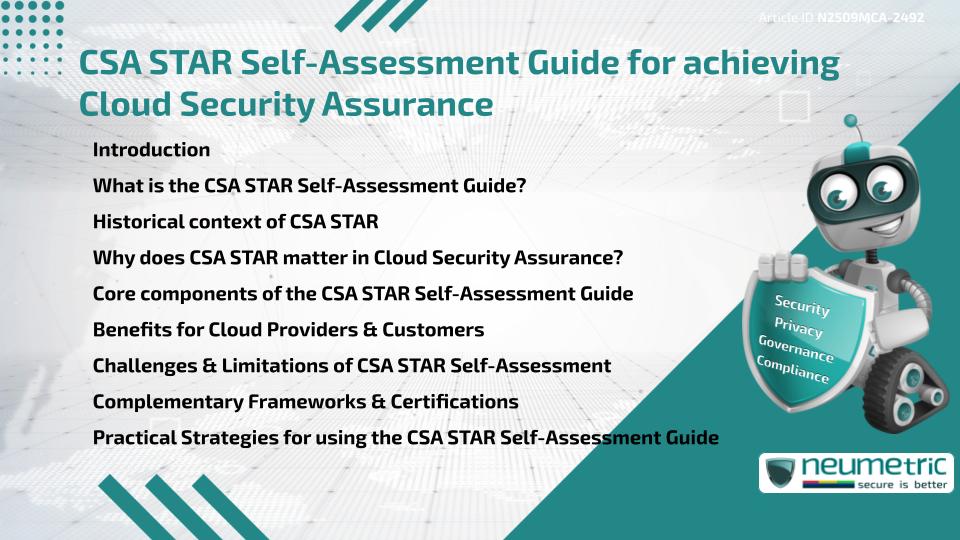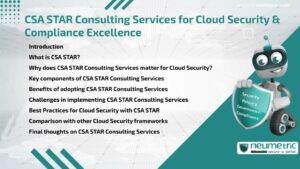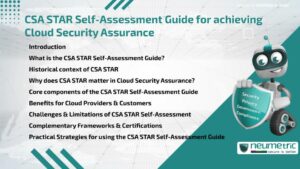Table of Contents
ToggleIntroduction
The CSA STAR self-Assessment guide is a structured resource developed by the Cloud Security Alliance [CSA] to help Cloud service Providers demonstrate Transparency & Accountability in their security practices. It enables Providers to map their controls against the CSA’s Cloud Controls Matrix [CCM], offering Customers assurance that key Cloud Risks are being managed responsibly. By following the CSA STAR self-Assessment guide, Providers can improve Trust with Customers, meet Compliance Requirements & stand out in a competitive Cloud market. This article explores what the CSA STAR self-Assessment guide is, its historical roots, its role in Cloud Security assurance & strategies for using it effectively.
What is the CSA STAR Self-Assessment Guide?
The CSA STAR self-Assessment guide is part of the Security, Trust, Assurance & Risk [STAR] program created by the Cloud Security Alliance. It allows Cloud Providers to publish a detailed Self-Assessment of their Security Controls by aligning them with the CSA Cloud Controls Matrix. This publicly available document gives Customers visibility into how a Provider safeguards data, manages access & responds to security Threats.
Unlike Certifications that require external Audits, the CSA STAR Self-Assessment guide focuses on provider-led Transparency. Vendors can complete the self-Assessment & make it available in the STAR Registry, helping Customers compare different Providers’ security postures.
Historical context of CSA STAR
The CSA STAR program was launched in 2011 in response to growing concerns about Cloud Security & Compliance. Prior to STAR, Organisations had limited ways to evaluate a Provider’s security beyond marketing claims or lengthy Questionnaires. The CSA addressed this gap by creating a globally recognised program that encouraged standardised disclosure.
Over time, STAR expanded into multiple levels, including STAR Certification & STAR Attestation, which involve Third Party Audits. The CSA STAR self-Assessment guide remains the foundation, serving as the entry point for Cloud Providers to demonstrate their security maturity.
Why does CSA STAR matter in Cloud Security Assurance?
Cloud Security assurance is critical because Customers rely on Providers to host Sensitive workloads & Personal Data. A breach in a Provider’s environment can have widespread consequences. The CSA STAR Self-Assessment guide helps reduce uncertainty by showing Customers how controls map to Best Practices & Industry Standards.
For Customers, it provides a comparable benchmark when evaluating Providers. For Vendors, it signals a commitment to openness & security, strengthening Trust & Customer relationships.
Core components of the CSA STAR Self-Assessment Guide
The CSA STAR self-Assessment guide is structured around the Cloud Controls Matrix, which includes domains such as:
- Data Security & Information Lifecycle management
- Identity & Access Management
- Application & Interface security
- Security Incident Management
- Business Continuity & Operational Resilience
- Compliance with Legal & Regulatory requirements
Providers complete detailed responses in each area, explaining how they meet the Controls or where Gaps may exist. This comprehensive approach helps both Customers & Providers identify strengths & weaknesses.
Benefits for Cloud Providers & Customers
For Providers, the CSA STAR self-Assessment guide is a low-cost way to demonstrate security practices without undergoing immediate Third Party Audits. It improves market visibility by listing Providers in the STAR Registry & helps satisfy procurement requirements from Risk-conscious Customers.
For Customers, it offers Transparency & Consistency when comparing Providers. Rather than relying solely on contractual assurances, they gain insight into specific Controls & Policies. The guide also facilitates due diligence for Compliance Audits & Vendor Risk evaluations.
Challenges & Limitations of CSA STAR Self-Assessment
While the CSA STAR self-Assessment guide is valuable, it has some limitations. Since it is self-reported, accuracy depends on the honesty & thoroughness of the provider. Customers may need to request additional Evidence or pursue Third Party Certifications for higher assurance.
Smaller Providers may also find the process resource-intensive, as documenting responses across all CCM domains requires time & expertise. Additionally, Customers must interpret the responses carefully, as the guide does not provide a scoring system or guarantee effectiveness of controls.
Complementary Frameworks & Certifications
The CSA STAR self-Assessment guide should be viewed as a starting point rather than a complete assurance mechanism. Many Providers supplement it with recognised Certifications such as ISO 27001, SOC 2 or FedRAMP for Government-related workloads.
Together, these frameworks provide a layered approach to assurance, combining self-reported transparency with independent validation. Customers often prefer Providers who pursue both Self-Assessment & Certification to balance disclosure with verification.
Practical Strategies for using the CSA STAR Self-Assessment Guide
To maximise the value of the CSA STAR Self-Assessment guide, Providers & Customers should:
- Ensure responses are complete, detailed & supported by Policy documents.
- Regularly update the Assessment to reflect changes in Security Controls or Organisational structure.
- Use the STAR Registry to compare Providers & shortlist those with transparent practices.
- Treat the Self-Assessment as part of a broader assurance program rather than a standalone exercise.
- Engage in dialogue between Customers & Providers to clarify ambiguous responses.
By applying these strategies, Organisations can turn the CSA STAR Self-Assessment guide into a practical tool for building Cloud Security assurance.
Conclusion
The CSA STAR self-Assessment guide is an essential resource for achieving Cloud Security assurance. It empowers Providers to showcase their Controls, Customers to evaluate Risks & the industry as a whole to embrace greater Transparency. Although it has limitations, especially as a self-reported measure, it forms the foundation of the broader CSA STAR program & supports stronger trust in Cloud relationships.
Takeaways
- The CSA STAR self-Assessment guide helps Providers demonstrate Transparency in Cloud Security.
- It maps Security Practices to the CSA Cloud Controls Matrix.
- Customers gain visibility into Provider security practices through the STAR Registry.
- Challenges include reliance on self-reporting & interpretation of responses.
- Complementary Certifications like ISO 27001 or SOC 2 enhance assurance.
FAQ
What does CSA STAR stand for?
CSA STAR stands for Cloud Security Alliance Security, Trust, Assurance & Risk.
Who can use the CSA STAR self-Assessment guide?
Any Cloud Service Provider can complete the guide to disclose security practices in alignment with CSA controls.
Is the CSA STAR self-Assessment guide a certification?
No, it is a voluntary disclosure tool. Certifications are available under higher STAR program levels.
How is the CSA STAR Self-Assessment published?
Completed assessments are typically uploaded to the CSA STAR Registry, making them publicly accessible.
Why should Customers trust a CSA STAR Self-Assessment?
It provides transparency into Provider Controls, though Customers may need additional verification through Audits or Certifications.
Does the CSA STAR Self-Assessment replace other Compliance Requirements?
No, it complements but does not replace standards like ISO 27001, SOC 2 or Government frameworks such as FedRAMP.
How often should Providers update their CSA STAR Self-Assessment?
Providers should update it whenever significant changes occur, but at least annually for accuracy.
Need help for Security, Privacy, Governance & VAPT?
Neumetric provides organisations the necessary help to achieve their Cybersecurity, Compliance, Governance, Privacy, Certifications & Pentesting needs.
Organisations & Businesses, specifically those which provide SaaS & AI Solutions in the Fintech, BFSI & other regulated sectors, usually need a Cybersecurity Partner for meeting & maintaining the ongoing Security & Privacy needs & requirements of their Enterprise Clients & Privacy conscious Customers.
SOC 2, ISO 27001, ISO 42001, NIST, HIPAA, HECVAT, EU GDPR are some of the Frameworks that are served by Fusion – a SaaS, multimodular, multitenant, centralised, automated, Cybersecurity & Compliance Management system.
Neumetric also provides Expert Services for technical security which covers VAPT for Web Applications, APIs, iOS & Android Mobile Apps, Security Testing for AWS & other Cloud Environments & Cloud Infrastructure & other similar scopes.
Reach out to us by Email or filling out the Contact Form…





